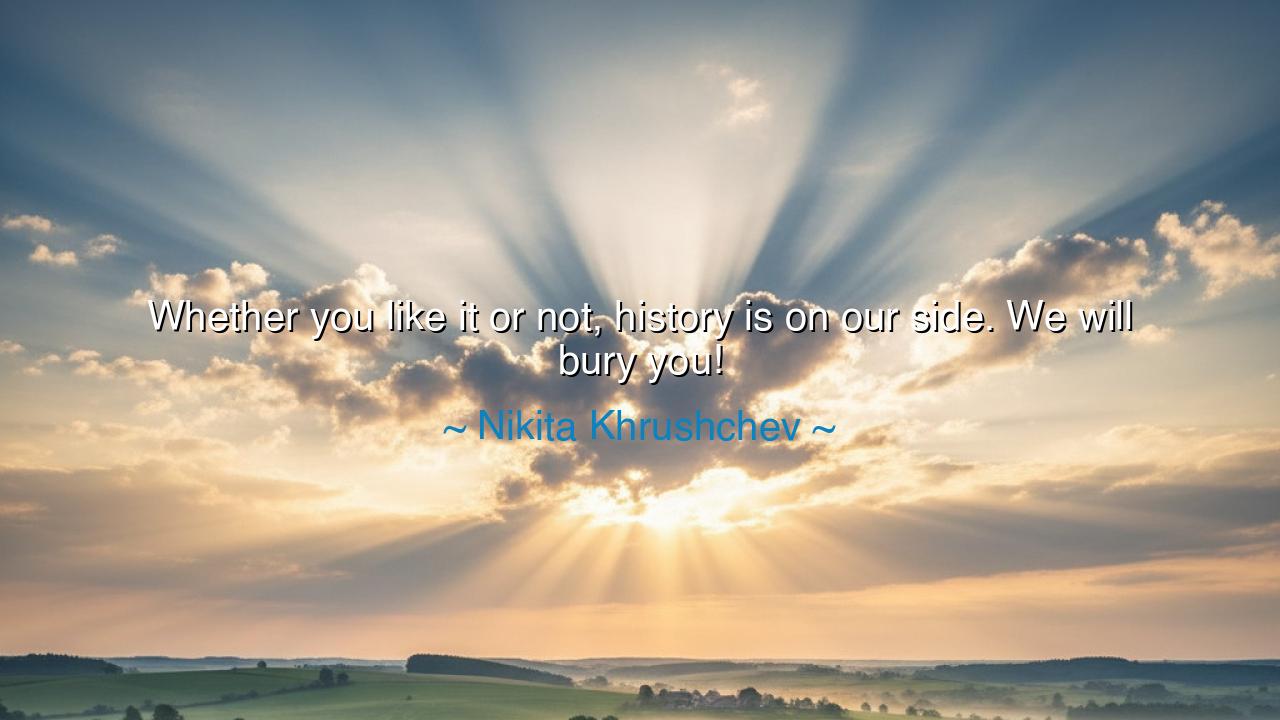
Whether you like it or not, history is on our side. We will bury






“Whether you like it or not, history is on our side. We will bury you!” Thus thundered Nikita Khrushchev, the fiery leader of the Soviet Union, as he stood before the Western powers in the heat of the Cold War. His words, sharp as iron and hot as forge-fire, were not mere boast or insult, but a declaration born of an age when the world itself seemed divided between two destinies — Communism and Capitalism, East and West, the red star and the white eagle. It was in 1956, at a reception in Moscow for Western diplomats, that these words were spoken, echoing through the halls of the world like a cannon. Yet behind the fury of the statement lies a deeper truth about the human conviction in one’s own vision of history, and the peril that comes when ideology believes itself the hand of fate.
To understand this moment, one must step into the shadowed theater of the Cold War, when fear was a daily wind that blew from every direction. The earth itself was divided not by oceans, but by belief. The Soviet Union stood as the citadel of Marxism-Leninism, proclaiming that history moved through struggle — that one system would give way to another, as the slave gave way to the serf, and the serf to the worker. Khrushchev, inheritor of Lenin’s dream and Stalin’s empire, believed with unshakable certainty that Communism was the inevitable destiny of mankind. His declaration — “History is on our side” — was not a threat of annihilation, as many in the West heard it, but a proclamation of faith in historical determinism: the belief that the tides of time would sweep away capitalism as surely as the sun rises after night.
Yet even faith, when wielded with pride, becomes weapon. The words “We will bury you!” struck terror in the hearts of those who heard them. To the West, it sounded as though Khrushchev promised the destruction of all free nations, the triumph of the Soviet hammer over the Western world. But to Khrushchev himself, the phrase was not a threat of literal death, but of historical succession. He meant, “We will outlast you. Your system will die by its own decay, and we will stand over its grave — not by violence, but by time.” In his mind, Communism was not merely an ideology but a law of nature, destined to replace capitalism as one epoch replaces another. Yet such confidence, though grand in vision, carried within it the seed of blindness — for history, though it moves, bows to no ideology. It honors only truth, and punishes all who claim to master it.
The world would soon see the irony of his prophecy. The Soviet Union, once mighty and resolute, would itself crumble decades later, undone not by war, but by its own contradictions — the very fate Khrushchev had predicted for others. Thus history, impartial and unmerciful, revealed its lesson: that no man, no nation, and no belief can command it forever. The pendulum of power swings for all, and those who proclaim themselves its masters are often the first to fall beneath its weight. Khrushchev’s boast became a warning — a reminder that hubris is the enemy of endurance, and that to speak for history is to invite its judgment.
Yet there is something noble, too, in the fire behind his words. For in every age, there have been those who believed they stood with the current of history — that they fought not for themselves, but for the future. The abolitionists who ended slavery, the revolutionaries who cast off tyranny, the visionaries who dreamed of justice — all have felt the same conviction that history was on their side. And sometimes, it was. Great change is born from those who dare to believe that the world can be remade. The danger, as Khrushchev’s fate teaches, is to confuse belief with inevitability — to think that righteousness alone guarantees victory. For the future does not favor those who demand it; it favors those who earn it, through humility, courage, and wisdom.
The story of Khrushchev’s declaration is therefore not merely political — it is human. It speaks to the eternal temptation to believe that history is destiny, and that one’s own cause is the chosen path of time. But the truth is more complex. History is not a servant; it is a mirror. It reflects the deeds of men — their pride, their compassion, their folly. Those who act with arrogance will see in it their downfall; those who act with integrity will see their endurance. The wise, therefore, do not claim history’s favor. They act rightly and let history decide.
So, my child of the future, remember the lesson hidden in these fierce words. Do not speak as though history is on your side; instead, live so that it may one day be said it was. Stand for justice, but without arrogance. Build boldly, but with humility. The victors of one age may be the fallen of the next, but those who act with truth and compassion are never buried — for their legacy lives on in the conscience of humankind.
For in the end, history buries only the proud, while it immortalizes the wise. And perhaps that is what Khrushchev, in his passion and conviction, did not yet understand: that the side of history is not chosen by ideology, but by humanity itself — by those who serve not power, but the greater good of all.






AAdministratorAdministrator
Welcome, honored guests. Please leave a comment, we will respond soon